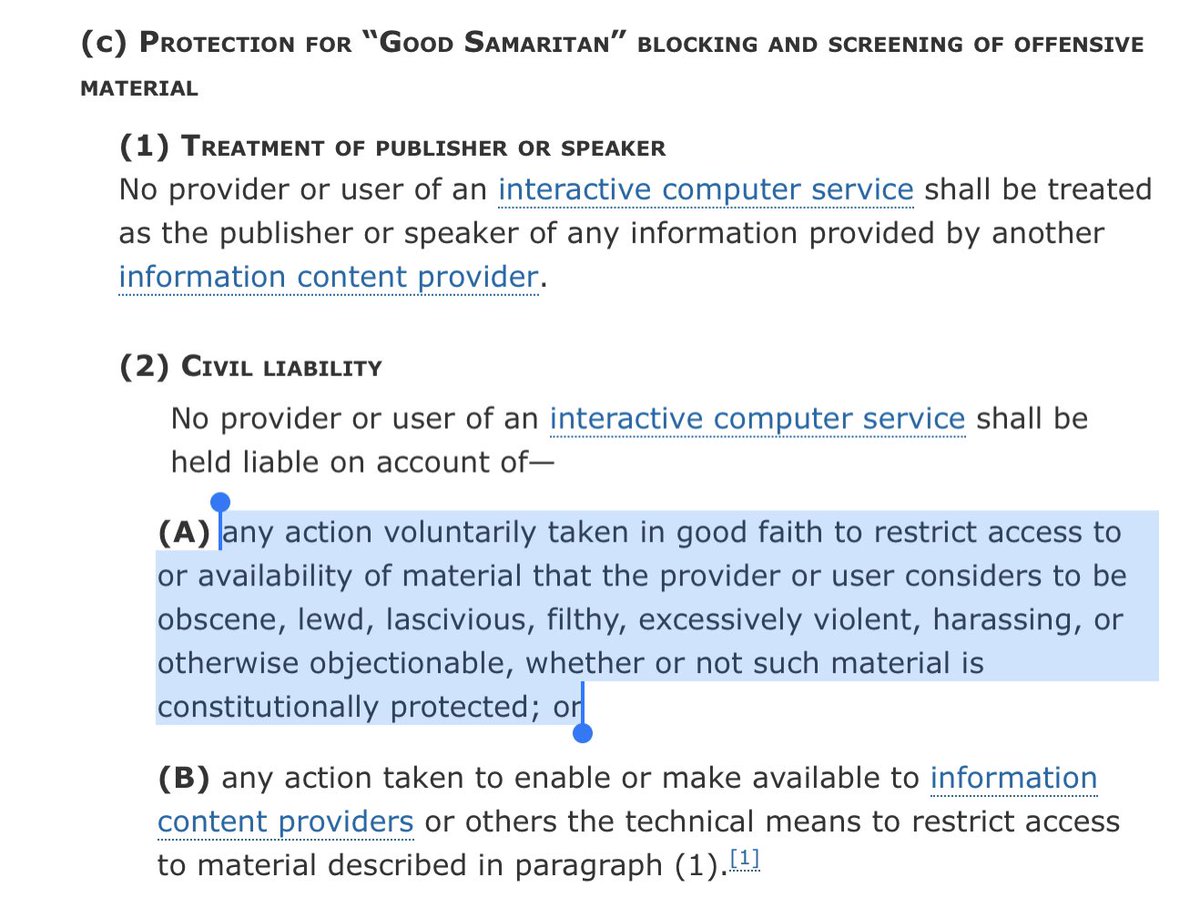
OK, I guess I need to spell this out, because apparently a lot of people find it confusing. It is absolutely true that *in practice*, *today*, the repeal of 230 would likely induce MORE censorship from risk-averse companies.
https://twitter.com/normative/status/1466120468209954821
That’s because, demonstrably, there’s little mass commercial appeal for platforms that do no moderation at all & get taken over by porn, spam, and trolls. But it’s also true that Section 230 (part of the Communications Decency Act) was partly meant to enable censorship.
Here’s the background: In 1991, a federal court held in Cubby v. Compuserve that the service was not liable for defamatory content posted by users. Compuserve was a mere distributor of the content, not a publisher, because it did not review or control user content.
This is pre-230, as a matter of common law. But then in 1995, in Stratton Oakmont v. Prodigy, the NY Supreme Court found that Prodigy WAS liable as a publisher because they exercised editorial control over user content—moderating forums & screening out profane language.
Congress saw that this presented online companies with an ugly choice: Don’t moderate at all and avoid liablity (turning every online space into a playground for porn, spam, and trolls), or moderate SUPER aggressively, removing all content anyone complained about.
Congress wisely sought to avoid forcing this choice. They wanted to statutorily codify the principle that platforms could not be sued for the speech of users AND ALSO that they would not risk this immunity by engaging in moderation (or, if you prefer, “censorship”).
In other words, platforms would not be effectively COMPELLED to censor (by liability risk), but they would also be FREE to censor. There would not be a forced choice between Nazis-and-porn free-for-all or maximally risk-averse hypermoderation.
BOTH prongs of this are good for online speech. That’s why the preface is a paean to the digital marketplace of ideas, but then a major section of the law is titled “protection for… blocking and screening of offensive material.” 

So both things are true. 230 was meant to protect the flourishing online marketplace of ideas. It was *also* meant to encourage service providers to censor (or, if you prefer “moderate”).
In effect, it says: “Don’t worry about that Stratton-Oakmont ruling. You are free to filter or remove any speech you consider objectionable. You will not suddenly become liable for user-generated content by doing so; you still can’t be sued for the speech you didn’t remove.”
And this is exactly right. Nobody really wants an Internet where all speech fora are either totally unmoderated sewers or hyperpoliced Disneylands where every post has to be approved in triplicate by a paranoid legal department.
So there’s no contradiction here. 230 protects vibrant fora for online speech. It also protects and enables (private, non-governmental) censorship. It does both things. It was INTENDED, very explicitly, to do both things. And both of those things are, on net, good.
And again, this is not just a protection for platforms, but for users. It applies to every individual who moderates user comments on their YouTube channel, Twitch chat, Discord server, blog, Facebook wall, e-mail listserv… etc etc etc.
Thanks to 230, you can delete those troll comments (or at least try) without becoming legally liable for every comment you didn’t delete. You are empowered to “censor” your own little corner of the Internet without taking on ruinous litigation risk as a result.
As a final point: It might seem NOW like Congress shouldn’t have worried major companies would go the 4Chan route and just adopt a no-rules approach. NOW we think they’d take the other path & over-moderate.
But remember this is 1995. You think “Internet platform” now and you think of multi-billion dollar companies with sophisticated machine learning algorithms that do algorithmic filtering. That’s not what 1995 looks like.
At the time, it was not at all crazy to think many companies would conclude that moderation at scale aggressive enough to mitigate litigation risk was infeasible, and choose the Wild West option.
• • •
Missing some Tweet in this thread? You can try to
force a refresh



